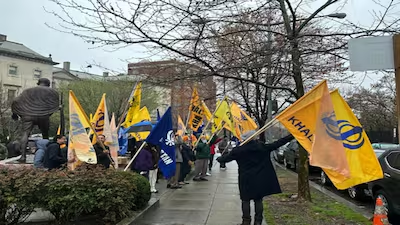Delhi Court Dismisses Plea Challenging Ayodhya Verdict, Fines Lawyer Mahmood Pracha ₹6 Lakh for Misuse of Judicial Process
A Delhi court has dismissed a petition filed by advocate Mahmood Pracha, who sought to invalidate the Supreme Court’s landmark 2019 Ayodhya verdict.
Pracha had approached the district court challenging an earlier civil court order that rejected his plea on the matter.
In his petition, Pracha had alleged that the then Chief Justice of India, Justice D.Y. Chandrachud, had suggested in a public speech that the Ayodhya judgment was based on a resolution offered by “Lord Ram Lalla.”
Citing this, he argued that the verdict was not judicially sound and should be declared void.
However, the Patiala House Court emphatically rejected the claim, clarifying that Justice Chandrachud never stated that any divine entity dictated the judgment.
Instead, he had simply mentioned seeking spiritual guidance, a purely personal and devotional expression—not an indication of bias or external influence.
District Judge Dharmender Rana observed that Pracha had misinterpreted and misconstrued the speech, confusing the concept of “God” with the legal idea of a juristic deity recognized under Indian law.
The court stressed that Pracha’s arguments reflected a fundamental misunderstanding of basic legal principles.
Labeling the petition as “frivolous, misconceived, and a gross abuse of the judicial process,” the court not only upheld the lower court’s decision but also enhanced the penalty imposed on Pracha.
The earlier fine of ₹1 lakh was increased to ₹6 lakh, to be paid as a deterrent against such misuse of court proceedings.
Citing the Judges Protection Act, 1985, the court reiterated that civil suits aimed at questioning judicial decisions in this manner are barred, and such actions unnecessarily erode public trust in the judiciary.
Judge Rana also remarked that attempts to misuse the legal system to cast aspersions on judges and public officials must be curbed firmly.
The court’s stern observations noted that when individuals responsible for upholding the law themselves engage in such tactics, it becomes essential for the judiciary to intervene strongly to protect the institution’s integrity.
Ultimately, Pracha’s appeal was rejected, and the enhanced penalty was imposed to send a clear signal against frivolous litigation.
#AyodhyaVerdict #DelhiCourt #RuleOfLaw #LegalAccountability #JudicialIntegrity #CourtsSpeak #ConstitutionalJustice #FrivolousLitigation #RespectTheJudiciary




